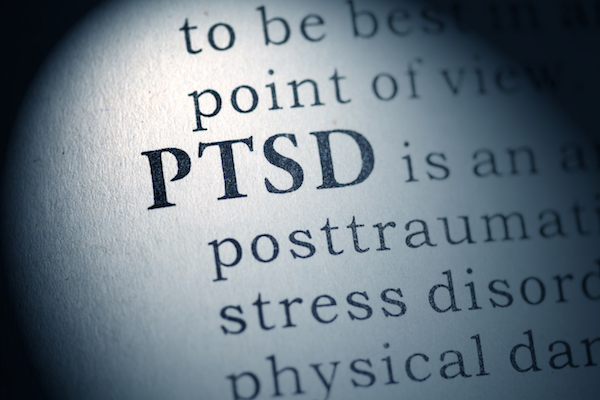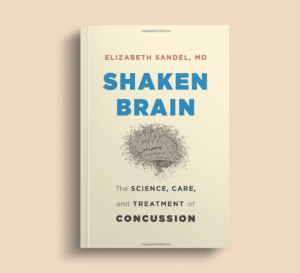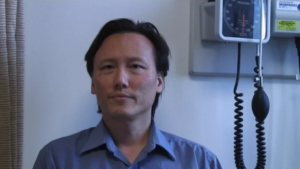Veterans Can Face Both a Brain Injury and PTSD

Post-traumatic stress disorder (PTSD) and traumatic brain injury (TBI) are frequently comorbid, meaning they are both conditions affecting a person, particularly in the military and veteran populations. This is one of the topics I discuss with the subject of my interview this month, Dr. Anthony Chen, a neurologist at the VA in Martinez, CA who works one-on-one with veterans who suffered a brain injury. Dr. Chen is both a clinician working with patients at the Center for Integrated Brain Health and Wellness and a research neuroscientist who’s on the faculty at Veterans Affairs Northern California Health Care System and the University of California, San Francisco. He offers an interesting perspective, as he comes at the topic as both a clinician and a researcher.
First, let’s look at PTSD and TBI separately, then together.
PTSD and TBI, Individually
PTSD arises after a traumatizing life event such as a bad car wreck or violent assault. In military personnel and veterans, PTSD commonly appears after being in combat situations. PTSD is characterized by emotional and behavioral disturbances, and symptoms of PTSD include flashbacks of intrusive, emotionally-charged memories of the event, avoidance of situations that recall the event, feeling of being “jumpy” or on-guard all the time, and mood disturbances. Sleep may be disturbed and the person can have frequent nightmares.
TBI is a physical injury to the brain that can lead to changes or impairments in cognition, personality, emotion, and physical health. TBIs include concussions, which are called “mild TBIs” because the length of loss of consciousness is under 30 minutes (or there is only impairment, like confusion, not loss of consciousness). However, not all people who have experienced a TBI will experience the same symptoms, and some people experience symptoms for only a short time. Still others have long-term symptoms caused by their TBI. Like PTSD, situations that can lead to a TBI include a car wreck, assault, or blast injury in combat.
PTSD and TBI together
There is overlap with the symptoms of PTSD and TBI. Sleep disturbance, mood changes, and headaches are common in both conditions. This, of course, makes the final diagnosis difficult. There is some evidence that there are physical changes in the brain from PTSD, but these changes seem to have a different pattern than in TBI.
PTSD and TBI are sometimes called the “signature wounds” of the conflicts in Iraq in Afghanistan, where improvised explosive devices (IEDs) and grenades are common. When occurring together, it can be difficult to parse them during an evaluation to determine which symptoms are being caused by the PTSD and which are caused by the TBI. Dr. Chen agrees that this can complicate the evaluation process and the care given.
Think of it from the point of view of an imaginary patient.There’s an explosion during combat that causes a blast injury leading to persistent symptoms of brain injury afterwards. There’s the emotional trauma of having lived through the event, which leads to PTSD that also lasts indefintely. This patient experiences difficulties with various aspects of cognition as well as sleep disturbances, anxiety, difficulty concentrating and headaches. Are these things the result of the PTSD or TBI? It’s not possible to say with total accuracy.
Dr. Chen refers to it as “combined combat neurotrauma,” which recognizes the mix of the two, both the physical damage to the brain and the experiential trauma. Emotion and cognition are not separated in the brain, but are intricately linked, feeding back on each other and enhancing or detracting one another. There’s no such thing as “just” a physical injury to the brain, and PTSD should not be thought of as “just” an issue of emotional disturbances. The answer is not to try to try hard to separate them, but to treat them both.
Learn more
To hear more about Dr. Chen’s views on the comorbidity of PTSD and TBI in veterans, and much more on the topic of brain injury in veterans and on cognitive rehabilitation, watch the entire interview below or here.
You Might Also Like
Modeling Brain Injury Care in the VA System
Dr. Anthony Chen is a neurologist specializing in the evaluation and treatment of veterans with traumatic brain injuries. Dr. Chen discusses the treatment of cognitive disorders that occur after these injuries, and the common co-occurrence of post-traumatic stress disorder and other mental health conditions in people with a history of…
A Veteran Talks About his Brain Injuries and Care at the VA
A veteran talks about his experiences with several concussions, and his successful treatment with cognitive and group therapies at the Veterans Administration program in Martinez, California.
Cognitive Deficits In Veterans After Brain Injury
Cognitive deficits experienced by military personnel and others can be successfully treated with cognitive therapies.
Keep up to date
Get updates on the latest in concussion, brain health, and science-related tools from Dr. Elizabeth Sandel, M.D.
By clicking SIGN UP, you agree to receive emails from Dr. Sandel and agree to our terms of use and privacy policy.
Get the book!




